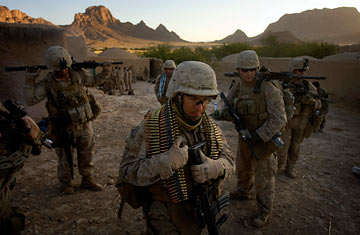
U.S. Marines prepare to set off from their patrol base in an Afghan village during Day 3 of Operation Germinate in Farah province, southern Afghanistan
There's no question that President Barack Obama is taking his time in deciding whether to send the 40,000 extra U.S. troops to Afghanistan that his commander has requested. The debate in Washington is over whether that delay constitutes dangerous "dithering" in the face of a growing danger or prudent pause in the face of a looming quagmire.
The President in March announced a "comprehensive new strategy" for waging war in Afghanistan and promptly dispatched a fresh general to implement it in June. But having received General Stanley McChrystal's grim assessment of the situation on the ground and his request for reinforcements, Obama has spent the past two months — as U.S. deaths in Afghanistan have reached historic highs — weighing the wisdom of both decisions. In Washington, backers of McChrystal and his manpower-intensive counterinsurgency strategy say delaying the dispatch of reinforcements endangers the mission, but those who are more skeptical of the military's ability to turn the situation around praise Obama's methodical approach, in hopes it will prevent Afghanistan from becoming another Vietnam.
America's top military officer has endorsed the President's go-slow approach. "There's been a lot of discussions, a lot of questions and clarifications on exactly what the specifics are, and quite frankly I applaud that," Admiral Mike Mullen, chairman of the Joint Chiefs of Staff, said on Wednesday. "I do expect that the President will make a decision here in the next few weeks." Mullen added that McChrystal recently told him that the "deliberations have really shed light in areas that have been very important to review to a depth and a breadth to really understand what is a very, very complex situation."
That wasn't the message McChrystal delivered in his Aug. 30 assessment, when he declared that "time is of the essence." He repeatedly stressed "the importance of time" and added that "the short-term fight will be decisive." McChrystal wrote that "we must act now to reverse the negative trends and demonstrate progress" and made clear that "time matters." Yet there are now hints that Obama may not make a decision on troops until late November, two months after McChrystal submitted his request.
There are costs associated with delay, just as there are costs in making the wrong decision. "Each day that passes erodes domestic and foreign support for the war," Anthony Cordesman, a military expert with the Center for Strategic and International Studies, said on Thursday. What Obama ultimately decides and how he shares it with the world "will be one of the defining acts of his presidency, and its ultimate success may well determine whether he has a second term."
Some top logistics officers say moving additional U.S. forces to Afghanistan is a slow process and needs to start as soon as possible if U.S. forces are to be in place for next spring's expected Taliban offensive. "Even if the President orders 40,000 troops to Afghanistan tomorrow, we can't fly everything into the theater," an officer said on condition of anonymity. "It's 45 days from the U.S. to Pakistan [by sea], and then another two weeks over land into Afghanistan." Some military officers say privately that a quick, forceful decision creates its own momentum toward success, while a dragged-out process makes troops, allies, Congress and the U.S. public question U.S. resolve. ("Honestly, in Europe there is not great enthusiasm for sending more troops to Afghanistan," European Commission president Jose Manuel Barroso said on Nov. 3.)
Pentagon officials acknowledge a "mild case of heartburn" over the delay, but they like the idea of the "political buy-in" it will represent once Obama decides. Still, they wish the issue hadn't achieved such a high profile. The Obama White House, they say, brought much of this upon itself with its running tally of (now seven) top-level, top-secret meetings, including the attendees and topics being discussed in the media. The Administration compounded its problems by asking McChrystal for his assessment after only 60 days in Afghanistan, well before all the 21,000 U.S. troops ordered there by Obama had arrived and had a chance to make a difference. The "Can this marriage be saved?" relationship between Washington and Afghan President Hamid Karzai has also prolonged the U.S. review.
While the wisdom of such lengthy study is subject to debate, not so the reality of the calendar. Time is either an ally or a foe of any commander. "You may have the watches," the Taliban like to say, "but we have the time." No one knows that as well as McChrystal. "Failure to gain the initiative and reverse insurgent momentum in the near-term (next 12 months) — while Afghan security capacity matures — risks an outcome where defeating the insurgency is no longer possible," he wrote on Aug. 30. If, as some at the Pentagon expect, Obama won't decide on how many reinforcements to send until near the month's end, that represents three months of McChrystal's critical year.
